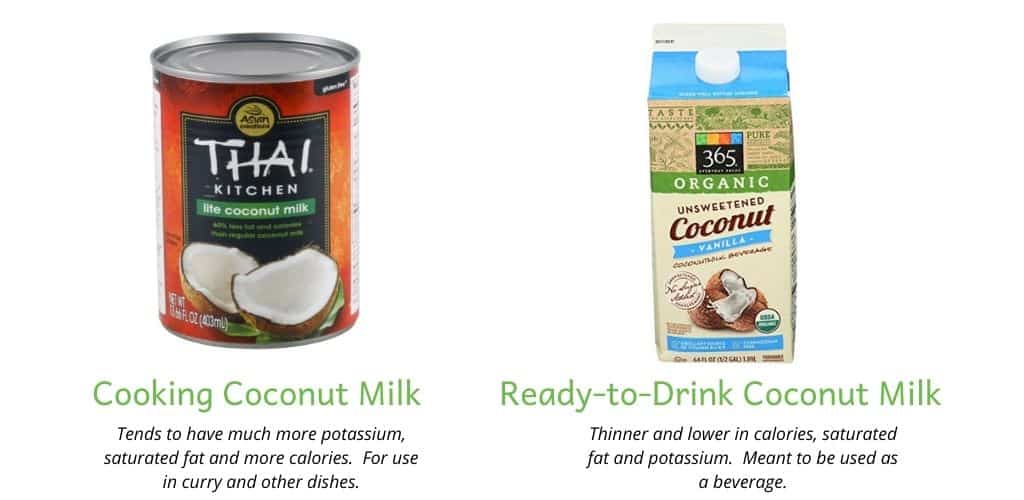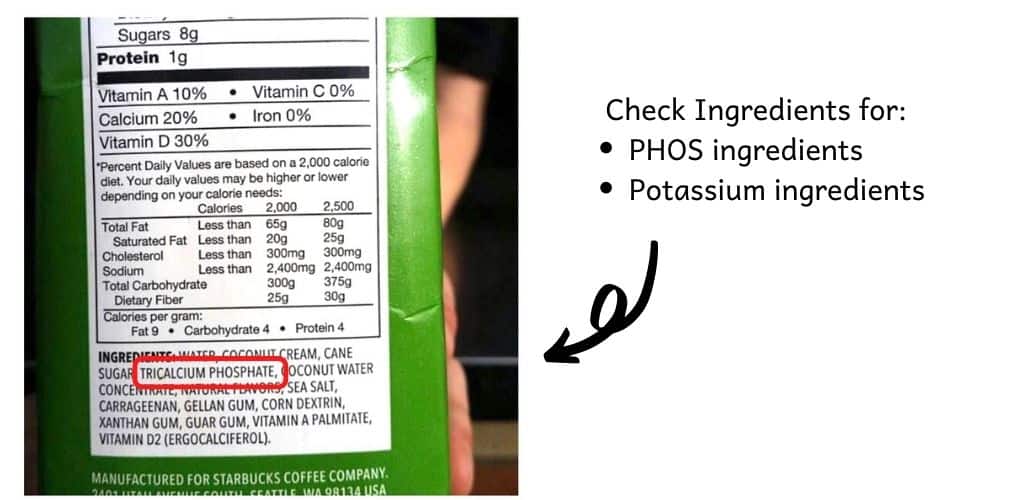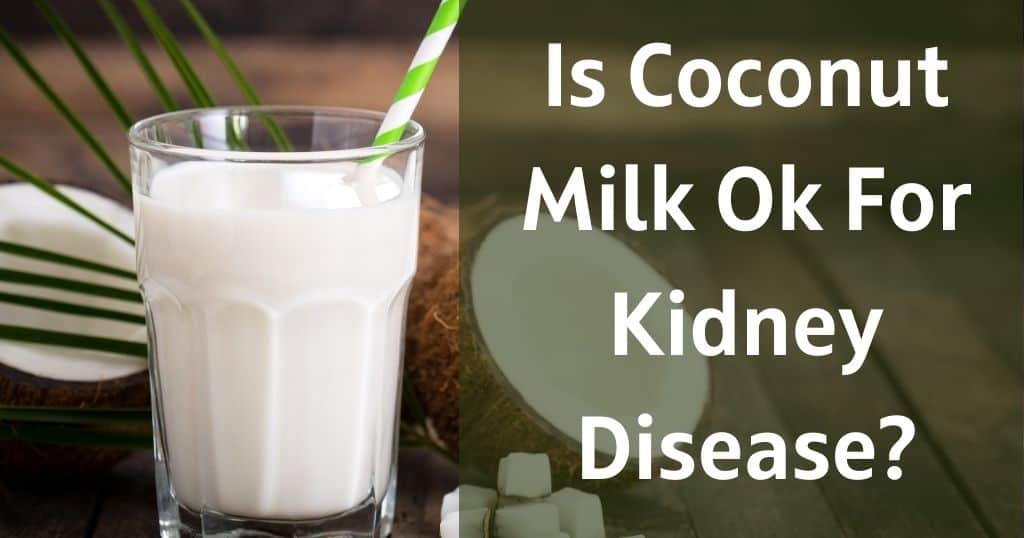*Please note that this post contains clearly identified affiliate links. If you click on these links and choose to make a purchase, I may receive a commission (at no cost to you). As an Amazon Associate I earn from qualifying purchases.
This is a question I often get “is coconut milk ok for kidney disease”? Because a healthy diet is not the same for everyone with kidney disease, lets dive into the details to help you figure out what is best for you.
Table of Contents
Ready-to-Drink vs. Cooking Coconut Milk
Before we jump into our main question “is coconut milk ok for kidney disease”, it is important to make this important distinction.
You can find two very different types of coconut milk at the grocery store. Ready-to-drink coconut milk is thinner and contains fewer calories, fat and potassium compared to canned coconut milk. Cooking coconut milk usually comes in a can and is used for tasty Thai curry dishes.

Cooking coconut milk can have TONS of potassium and unhealthy saturated fat. For some people with kidney disease, this extra potassium can be dangerous. For others, extra potassium is beneficial. However, cooking coconut milk can add a delicious sweetness and creaminess to curries. I do recommend choosing the “lite” version to cut back the saturated fat for heart health.
Most of the information in this article refers to “ready-to-drink” coconut milk.
Dairy and Kidney Disease
Dairy has a bad reputation when it comes to kidney disease. This may leave you wondering, is coconut milk ok for kidney disease as an alternative to regular cow’s milk?
Dairy has become a taboo on the “renal diet” because it has a fair amount of potassium and phosphorus in it. For some people with kidney disease, it is important to limit these nutrients. But this is not the case for everyone. Read on to understand if these nutrients are a concern for you.
Potassium in Coconut Milk
It is very important to note that not everyone with kidney disease needs to limit potassium. In fact, it is healthy for people with earlier stages of kidney disease to eat a high potassium diet. If this describes you, you do not need to be concerned about the potassium in cow’s milk. In fact, the potassium may help control your blood pressure! (1)
For some people in the later stages of kidney disease, the kidneys are not able to get rid of potassium as well. This causes high blood potassium levels. You only need to limit potassium if you have high levels of potassium in your blood.
If you do have high levels of potassium in your blood, coconut milk is a good choice! Ready-to-drink coconut milk has about 75% less potassium than cow’s milk. Most plant-based milks are lower in potassium than cow’s milk.
Phosphorus in Coconut Milk
Phosphorus is a little more tricky. Similar to potassium, limiting phosphorus becomes more important in the later stages of kidney disease. However, some studies have shown benefit to cutting back on phosphorus in the earlier stages too. (2) (3)
Cow’s milk does have quite a bit of phosphorus in it – about 340mg per 1 cup serving. However, if you are staying away from large portions of meat and phosphorus food additives, there is likely room in your diet for cow’s milk. In addition, our bodies do not absorb natural phosphorus as well as artificial phosphorus.
Coconut milk (and most plant-based milks) has much less phosphorus than cow’s milk – it has about 95% less phosphorus than cow’s milk! If you have high levels of phosphorus in your blood. Or, have Chronic Kidney Disease Stage 4 or 5 (a GFR less than 30ml/min), coconut milk is a better option to help you cut back how much phosphorus you eat.
Protein in Coconut Milk
Eating too much protein is associated with faster progression of kidney disease. (4) (5) (6) In fact, the National Kidney Foundation recommends that everyone with kidney disease limit how much protein they eat.(6) How much protein you need depends on many factors, including your stage of kidney disease and other medical conditions. However, a good rule of thumb is to eat no more than 0.6-0.8 grams of protein per kilogram body weight.(6)
Most people are eating much more protein than they need. This is especially true for people with kidney disease who are not on dialysis, who have lower protein needs.
Coconut milk (and most other plant-based milks) is much lower in protein compared to cow’s milk. One cup of cow’s milk has 8 grams of protein, compared to only 0.4 grams in coconut milk.
Coconut Milk vs. Other Milks For Kidney Disease
Of course, there are many types of plant-based milks available at the grocery store. The amount of protein, potassium, phosphorus and other nutrients is very different for the different kinds of milk. Generally, plant-based milks are lower in potassium than cow’s milk. The exception being soy milk, which has nearly the same amount of potassium as cow’s milk. However, the potassium amount is very different in different brands. If you need to limit potassium, check the nutrition facts label to make sure the brand you choose is not too high.
Generally, plant-based milks are lower in phosphorus and protein compared to cow’s milk.
Use this table to help you figure out the best type of milk for you!
| 2% Cow's Milk | Coconut Milk | Almond Milk | Soy Milk | Rice Milk | Oat Milk | |
|---|---|---|---|---|---|---|
| Calories | 122 | 69 | 36 | 74 | 52 | 130 |
| Protein (g) | 8 | 1 | 1 | 8 | 0 | 5 |
| Carbohydrate (g) | 12 | 8 | 3 | 4 | 7 | 24 |
| Fat (g) | 5 | 5 | 3 | 4 | 3 | 2 |
| Saturated Fat (g) | 3 | 4 | 0.2 | 1 | 0 | 1 |
| Potassium (mg) | 342 | 90 | 161 | 300 | 18 | 131 |
| Phosphorus (mg) | 224 | 17 | 22 | 105 | 80 | 150 |
All nutrition information is based on a 1 cup serving.
Nutrition values can differ significantly based on brand and product.
Warning: Potassium & Phosphorus Additives in Plant Based Milks
Unfortunately, many plant based milks available on the market contain phosphorus and potassium food additives. These ingredients can add significant amounts of potassium and phosphorus to your milk.
Always make sure to read the Ingredients on the Nutrition Label. Look for milks that do not have potassium ingredients. Or, ingredients that have the letters “PHOS” in them. PHOS ingredients contain artificial phosphorus.

Here are some kidney-healthy coconut milks that do not have added potassium or phosphorus:
- 365 Everyday Value Unsweetened Coconut Milk*
- 365 Everyday Value Vanilla Coconut Milk*
- 365 Organic Original Coconut Milk*
- Thai Kitchen Lite Unsweetened Coconut Milk*
Please note that ingredients often change. These products do not have potassium or phosphorus in them as of November 2020. Make sure that the milk you buy is kidney friendly!
The common So Delicious® and Silk® plant-based milk brands tend to have potassium and phosphorus additives.
Coconut Water & Kidney Disease
What about coconut water? Is that ok for kidney disease?
Coconut water tends to be very high in potassium. Most brands have around 450mg per one cup. For people in the later stages of kidney disease, this high potassium may be a problem.
Compared to coconut milk, coconut water generally doesn’t have potassium and phosphorus additives in it. But, always check the Ingredients label to make sure!
Coconut Oil & Kidney Disease
Coconut oil is certainly having a spotlight moment! Coconut oil has been touted as a health food to help with everything from depression to weight loss.
However, the research does not support these claims.
Coconut oil actually has more saturated fat in it than butter. We know that saturated fat is associated with heart disease. There is no well-done research to suggest that the saturated fat found in coconut oil is any different than the saturated fat in butter, shortening, fried foods and red meat. In fact, the American Heart Association issued a science advisory in 2017 against the use of coconut oil.(7) And, a recent study found that coconut oil raised cholesterol levels.(8)
Therefore, I do not recommend it be used regularly. Instead, similar to butter, it should be used in small quantities on occasion. Choose heart-healthy olive and vegetable oils most often!
Bottom Line: Is Coconut Milk Ok For Kidney Disease?
Yes! Coconut milk is ok for kidney disease! However, make sure to find a brand without potassium or phosphorus additives. If you have high levels of potassium in your blood, make sure to avoid large amounts of cooking coconut milk and check the ingredients for potassium additives.
Nutrition needs in kidney disease are very individual. Make sure to talk with your dietitian to make the best milk choice for you!
Happy Eating!
Melanie



I have been using Almond Breeze and I cannot find phos in the ingredients. Is Almond Breeze acceptable with kidney disease.
Depending on your labs, yes! Almond breeze does have potassium citrate in it. So, you might want to run that past your dietitian!
What about vanilla flavored coconut milk yogurt ? Is that low on phosphorus and potassium esp if they use calcium citrate.and not calcium phosphate for calcium levels.
I’d imagine vanilla coconut milk has about the same amount of phosphorus as unsweetened – and differs a lot by brand as you alluded to! However, it also would contain sugar, which might not be the best option for many people!
I found a brand of coconut milk that claims to be 100% coconut milk – Aroy-D. I did some research and discovered that it does have something added to prevent separation. No other additives. You can buy this milk from Amazon. It is creamy and can be substituted for milk in recipes. When making pancakes, it does not stick to the pan like almond milk. It does make a decently thick pudding. It does give a slight coconut flavor to foods, such as a white cream sauce. I found that an addition of a splash of vinegar helps cut the natural sweetness / coconut flavor without giving the food a vinegary taste.
My father has CKD with high potassium level. we make sure to check and cook food to decrease the potassium in his meals. however, still couldn’t able to control it much.
he is being avoiding all dairy products since 4-5 months. haven’t tried Coconut milk.
don’t believe in packed foods for him. can you provide recipe to make coconut milk.
also, can you provide customised diet for him? will share his reports if required.
Hello! This article is about coconut milk that is purchased from a grocery store. I don’t work with individual clients – I’d ask your nephrologist for a renal dietitian referral. Or, I have a list of dietitians who do work with clients individually on my resource page!
Is skin milk okay?
Skim milk, like all dairy milk, has a fair amount of phosphorus. Ask your dietitian what is best for you!
Love your article, however I’m still confused.
Would home made coconut milk made from organic full fat dried shredded coconut still have high potassium and/or phosphorous??
Bea
Hi Bea! Yes, homemade coconut milk would probably have similar potassium and phosphorus content because coconut itself contains those minerals. Of course, homemade coconut milk wouldn’t have phosphorus or potassium additives!
Hi! And thank you for the article!
Wouldn’t homemade coconut milk be low in phosphorus and potassium? I thought there was 75% less potassium and 95% less phosphorus then there is in regular cows milk.
Hi Natalie! I’d say that homemade coconut milk probably has similar potassium as commercial coconut milk – so yes, much lower! It would also be much lower in phosphorus as well – and definitely wouldn’t have any of those phosphorus additives in it!
Thank you so much for this information. Having had a kidney removed because of cancer I have found this “new” diet quite overwhelming at times. What I thought was good food (eg avocados) is now not good food etc! Our South African labels are not as good as overseas labels. I’m trying to learn as much as I can..
You are so welcome! Thank you for your comment. Avocadoes are high in potassium, but this is actually a good thing for many people! Do make sure to know your lab values to see if you need to limit potassium!
Hi Melanie, great article. Do you have info on potassium content of grated coconut? Thanks.
Hello! To find reliable potassium information on any food, the USDA National Nutrient Database is the best source. I’d check there for coconut and any other food you are interested in!
Very informative thank you now I learned more about coconut milk and the oil God bless
I am from Jamaica. Grew up eating and drinking coconut juice and milk. Now have to watch phosphorus so I am so glad coconut milk is ok. Just found, Simple truth coconut milk in Krogers. Beautiful milk, Potassium 55. Sodium 55. Calcium 450. Could not find Phosphorus. Glad to see it is low. According to your blog is only 17.
Thank you.
Hi Yvonne! So happy to help. Phosphorus can vary quite a bit between brands – and unfortunately it usually isn’t listed on the label. I just checked Simple Truth Coconut milk and it looks like it doesn’t have any phosphorus additives. Great find!
P.S – Jamaican food is one of my favorites! We hosted our rehearsal dinner for our wedding at a Jamaican restaurant! 🙂
So is coconut & oil more suitable than olive oil?…
Olive oil is definitely a more heart healthy option than coconut oil. Coconut oil has more saturated fat in it than butter!
Melanie, thanks so much for this informative article, just what I was looking for. I call So Delicious regarding the phosphorus content as it is not listed on the nutrition panel even though it is part of the ingredient statement. They advised they dont test for it because it’s not required which I find unbelievable. I personally like coconut milk better than the other but milks so I’m so glad you were able to list those without added potassium and phosphorus.
Hi Nadine! Thank you so much for your kind words! It is VERY crazy that phosphorus testing isn’t required – but true! Potassium only recently was added to minerals that need to be tested. Slowly, but surely, we are moving in the right direction.
Hi there…..what about Raw Milk?
Hi Ric! Raw milk would have a similar nutrient profile to normal cow’s milk. I would caution against it if you have a compromised immune system for any reason – such as a transplant. Hope that helps!